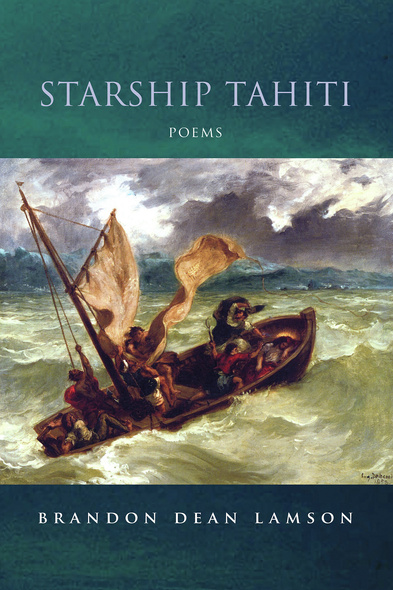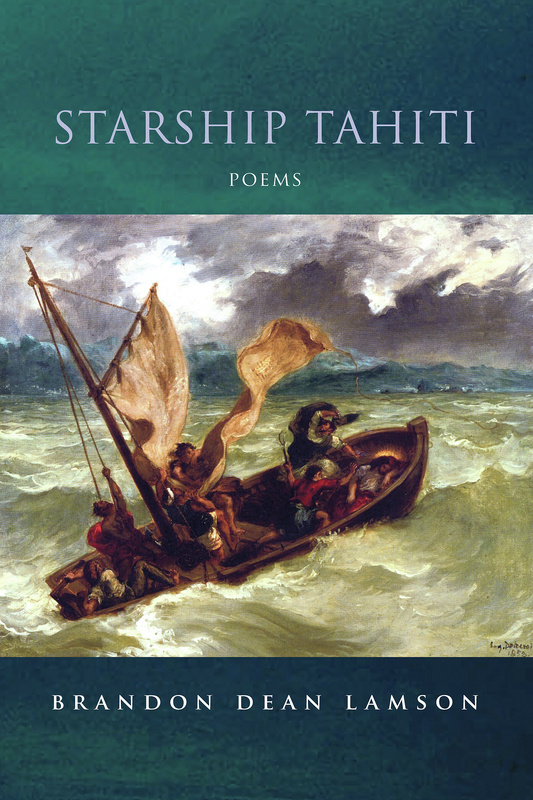Our shopping cart is currently down. To place an order, please contact our distributor, UTP Distribution, directly at utpbooks@utpress.utoronto.ca.
The poems in Brandon Dean Lamson's first volume, Starship Tahiti, explore imprisoned bodies and the tension between captivity and imagination. Beginning on Rikers Island, the book traces a creation myth in reverse, moving from prison to the spacious arches of Grand Central Station to the shores of the Chesapeake Bay.
Lamson examines themes of violence, gender, and identity in various real and imagined settings where inmates read Antigone, Howlin' Wolf sings in a black barbershop, and Metallica records burn on a Viking altar. Throughout these shifts, the poems construct fractured narratives that subvert linear storytelling. The layering of voice and imagery in this collection transgresses boundaries between the secular and the sacred, and between the communal and the personal. As the speaker of "Portland Bardo" says, "The fragile, in between state of larvae hatching / is no less desirable than full bloom in a city of roses, if such a city can ever be found."
Lamson examines themes of violence, gender, and identity in various real and imagined settings where inmates read Antigone, Howlin' Wolf sings in a black barbershop, and Metallica records burn on a Viking altar. Throughout these shifts, the poems construct fractured narratives that subvert linear storytelling. The layering of voice and imagery in this collection transgresses boundaries between the secular and the sacred, and between the communal and the personal. As the speaker of "Portland Bardo" says, "The fragile, in between state of larvae hatching / is no less desirable than full bloom in a city of roses, if such a city can ever be found."
To be a teacher in a prison, as Brandon Lamson shows us in these grave and unsettling poems, is to take on something akin to the role of Virgil in the Divine Comedy. Like that earlier illustrious guide, Lamson views the inhabitants of inferno and purgatory with neither horror nor pity, and this terse objectivity pervades his position toward contemporary urban culture in general. Like Thom Gun, whom he often resembles, Lamson finds a way to view our cityscapes and their squalor as places of gritty amazement and serendipitously discovered wonders. Still, these poems insist that the Panopticon, the metal detector, and the searing light of history watch and scan our every move, indicting us all. Starship Tahiti is an outstanding debut.'—David Wojahn, author of World Tree and Interrogation Palace: New and Selected Poems, 1982–2004
'Starship Tahiti immediately engages the reader, and from the first line, to the last, one hears an earthy calling. This collection travels, looping through headspace, with a measured, solid footing that only true genius dares or garners. These poems are risky, but Brandon Lamson knows something about the American psyche that exposes what we're thinking and feeling. This voice has been around a few sharp curves, and now he conducts a knowing music we can trust. And if we're looking for the truth, Starship Tahiti gets to the quick, but hones an edgy grace.'—Yusef Komunyakaa, author of The Chameleon Couch and Warhorses
'Deftly crafted works of prose poetry that evoke feelings and images that are universal in their appeal and unique in their substance.'—The Poetry Shelf
Brandon Dean Lamson is assistant professor of English at Bethany College. Before earning a PhD in literature and creative writing at the University of Houston, he taught for three years at an alternative school on Rikers Island in New York. He is the author of a chapbook titled Houston Gothic, and his poems have appeared in many places, including Brilliant Corners, Nano Fiction, Pebble Lake Review, and Hunger.





